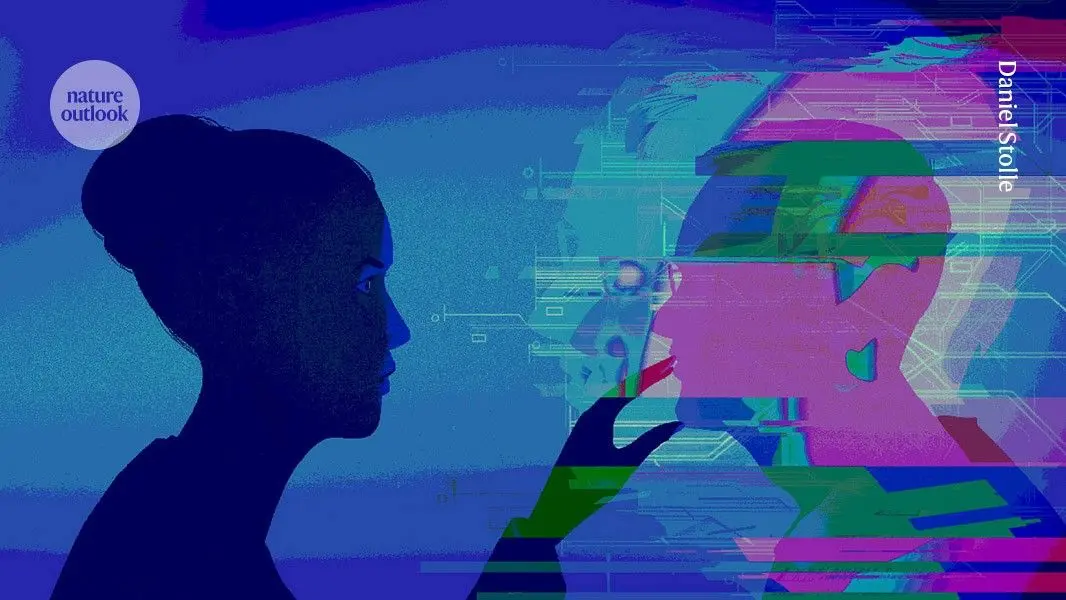The Ethical Dilemma of AI-Powered 'Digital Resurrection': Comfort or Exploitation?
2 Sources
2 Sources
[1]
Talking to dead people through AI: the business of 'digital resurrection' might not be helpful, ethical... or even legal
UOC - Universitat Oberta de Catalunya provides funding as a member of The Conversation ES. Earlier this year, a Spanish TV programme showed several people listening to digital recreations of the voices of their deceased relatives that had been generated by artificial intelligence from real audios. It sparked widespread debate in both public and professional spheres, as these recreations not only mimicked loved ones' voices, but also asked poignant, evocative questions, provoking intense emotional reactions. This phenomenon, which has been dubbed "digital resurrection", involves using advanced AI technology to recreate certain aspects of deceased individuals, such as their voice or physical appearance. While it may offer momentary comfort, such a practice opens a raft of profound debates on ethical, philosophical and legal fronts. The risk of creating false memories Chief among the philosophical implications of digital resurrection is that it calls into question what it really means to "be". By recreating the voice or likeness of someone who has passed away, we might believe we are extending their existence in some way, or perhaps that we are simply creating a shadow of them, lacking in substance. However, the essence of a human being is undoubtedly more than a set of programmed responses or an image on a screen, and it seems unlikely that a digital simulation can capture the depth and uniqueness of a person's lived experience, emotions and thoughts. Memory plays an important role here. Digital resurrection can be seen as an attempt to preserve memory, to maintain the presence of those we have lost. But human memory is not static - it selects, changes, shifts and adapts, and by digitally recreating a person, we run the risk of altering our own authentic memories of them. Is it ethical to hold on to an artificial representation of someone, instead of letting the memory of them evolve and transform over time? True identity A person's identity is a complex web of experiences and relationships. When we try to recreate someone, we might think we are trying to capture their identity. However, we are more likely to create an idealised version of them, one that conforms to our own expectations and desires. These technological advances also raise questions about grief itself. Death is a natural part of life, and mourning is essential for coming to terms with this loss. By trying to maintain a connection with the deceased through digital resurrection, we interfere with this vital process, which could prevent us from moving forward and finding peace in the acceptance of loss. Ultimately, digital resurrection also opens serious debate on the subject of consent and ownership. Who has the right to decide whether a person should be digitally recreated? And how can you handle the consent of someone who can, for obvious reasons, no longer express their wishes? Exploiting grief for profit We have to remember that technology is a business, and the prospect of companies making a profit by meddling with something as profoundly human and painful as the loss of a loved one raises further philosophical, ethical and moral questions. From an ethical point of view, this kind of business seems to transgress the fundamental principles of respect and dignity that should guide our human interactions. Grieving is an intimate and sacred process, a path to acceptance and inner peace after a significant loss. Commercial intrusion into this process could therefore be seen as a form of emotional exploitation, taking advantage of people at one of the most vulnerable moments in their lives. Business of this sort could also distort the natural grieving process. Grief and loss are essential experiences of the human condition, and dealing with them helps us to grow as people. If commercially marketed digital resurrection prevents people from moving through this process in a healthy way - offering an illusion of a person's presence rather than helping to accept the reality of their absence - it offers little by way of benefit. From a moral perspective, the intentions and purposes of such businesses would be questionable. In principle they seem to have the aim of providing comfort and a way of remembering loved ones. However, where do we draw the line between offering solace and exploiting grief for profit? Digital resurrection exacerbates grief At the heart of "digital resurrection" lies a profound and disturbing paradox. In its attempt to bring us closer to those we have lost, technology confronts us with the inescapable reality of their absence, leading us to question not only the nature of existence, but also the essence of what it means to be human. By attempting to make up for the absence of a loved one or fill the void they have left, these technologies deepen both our desire to hold on to what we have lost, and our own personal struggles to cope with and process grief in the face of the inescapable reality of death. The paradox is further extended when we consider that, in our effort to preserve the memory and essence of loved ones, we resort to simulations that, by their artificial nature, can never fully capture the complexity and depth of real human experience. Thus, we are faced with an imperfect, digitised representation that, while comforting in some ways, struggles to do justice to the true essence of someone we have loved and lost.
[2]
Talking to dead people through AI: The business of 'digital resurrection' might not be helpful, ethical or even legal
Earlier this year, a Spanish TV program showed several people listening to digital recreations of the voices of their deceased relatives that had been generated by artificial intelligence from real audios. It sparked widespread debate in both public and professional spheres, as these recreations not only mimicked loved ones' voices, but also asked poignant, evocative questions, provoking intense emotional reactions. This phenomenon, which has been dubbed "digital resurrection," involves using advanced AI technology to recreate certain aspects of deceased individuals, such as their voice or physical appearance. While it may offer momentary comfort, such a practice opens a raft of profound debates on ethical, philosophical and legal fronts. The risk of creating false memories Chief among the philosophical implications of digital resurrection is that it calls into question what it really means to "be." By recreating the voice or likeness of someone who has passed away, we might believe we are extending their existence in some way, or perhaps that we are simply creating a shadow of them, lacking in substance. However, the essence of a human being is undoubtedly more than a set of programmed responses or an image on a screen, and it seems unlikely that a digital simulation can capture the depth and uniqueness of a person's lived experience, emotions and thoughts. Memory plays an important role here. Digital resurrection can be seen as an attempt to preserve memory, to maintain the presence of those we have lost. But human memory is not static -- it selects, changes, shifts and adapts, and by digitally recreating a person, we run the risk of altering our own authentic memories of them. Is it ethical to hold on to an artificial representation of someone, instead of letting the memory of them evolve and transform over time? True identity A person's identity is a complex web of experiences and relationships. When we try to recreate someone, we might think we are trying to capture their identity. However, we are more likely to create an idealized version of them, one that conforms to our own expectations and desires. These technological advances also raise questions about grief itself. Death is a natural part of life, and mourning is essential for coming to terms with this loss. By trying to maintain a connection with the deceased through digital resurrection, we interfere with this vital process, which could prevent us from moving forward and finding peace in the acceptance of loss. Ultimately, digital resurrection also opens serious debate on the subject of consent and ownership. Who has the right to decide whether a person should be digitally recreated? And how can you handle the consent of someone who can, for obvious reasons, no longer express their wishes? Exploiting grief for profit We have to remember that technology is a business, and the prospect of companies making a profit by meddling with something as profoundly human and painful as the loss of a loved one raises further philosophical, ethical and moral questions. From an ethical point of view, this kind of business seems to transgress the fundamental principles of respect and dignity that should guide our human interactions. Grieving is an intimate and sacred process, a path to acceptance and inner peace after a significant loss. Commercial intrusion into this process could therefore be seen as a form of emotional exploitation, taking advantage of people at one of the most vulnerable moments in their lives. Business of this sort could also distort the natural grieving process. Grief and loss are essential experiences of the human condition, and dealing with them helps us to grow as people. If commercially marketed digital resurrection prevents people from moving through this process in a healthy way -- offering an illusion of a person's presence rather than helping to accept the reality of their absence -- it offers little by way of benefit. From a moral perspective, the intentions and purposes of such businesses would be questionable. In principle they seem to have the aim of providing comfort and a way of remembering loved ones. However, where do we draw the line between offering solace and exploiting grief for profit? Digital resurrection exacerbates grief At the heart of "digital resurrection" lies a profound and disturbing paradox. In its attempt to bring us closer to those we have lost, technology confronts us with the inescapable reality of their absence, leading us to question not only the nature of existence, but also the essence of what it means to be human. By attempting to make up for the absence of a loved one or fill the void they have left, these technologies deepen both our desire to hold on to what we have lost, and our own personal struggles to cope with and process grief in the face of the inescapable reality of death. The paradox is further extended when we consider that, in our effort to preserve the memory and essence of loved ones, we resort to simulations that, by their artificial nature, can never fully capture the complexity and depth of real human experience. Thus, we are faced with an imperfect, digitized representation that, while comforting in some ways, struggles to do justice to the true essence of someone we have loved and lost.
Share
Share
Copy Link
A Spanish TV program sparks debate on using AI to recreate deceased loved ones, raising ethical, philosophical, and legal questions about grief, memory, and the essence of human identity.

AI-Powered 'Digital Resurrection' Sparks Ethical Debate
A recent Spanish television program has ignited a widespread debate on the use of artificial intelligence (AI) to recreate deceased individuals, a phenomenon dubbed "digital resurrection." The program featured people listening to AI-generated voices of their departed loved ones, provoking intense emotional reactions and raising profound ethical, philosophical, and legal questions
1
2
.The Technology Behind Digital Resurrection
Digital resurrection utilizes advanced AI technology to recreate aspects of deceased individuals, such as their voice or physical appearance. While this technology may offer momentary comfort to grieving individuals, it has opened up a Pandora's box of complex issues that society must grapple with
1
2
.Philosophical Implications and the Nature of Being
The concept of digital resurrection challenges our understanding of what it means to "be." By recreating a person's voice or likeness, we may believe we are extending their existence. However, this raises questions about the essence of human beings and whether a digital simulation can truly capture the depth and uniqueness of a person's lived experiences, emotions, and thoughts
1
2
.The Risk of Altering Authentic Memories
Memory plays a crucial role in how we remember and honor the deceased. Digital resurrection attempts to preserve these memories, but it risks altering our authentic recollections. Human memory is dynamic, constantly changing and adapting. By creating a static, artificial representation of a person, we may interfere with the natural evolution of our memories
1
2
.Ethical Concerns and the Grieving Process
The technology raises significant ethical concerns, particularly regarding its impact on the grieving process. Mourning is a natural and essential part of coming to terms with loss. By maintaining an artificial connection with the deceased through digital resurrection, we may hinder this vital process, preventing individuals from moving forward and finding peace in accepting their loss
1
2
.Consent and Ownership Issues
Digital resurrection also opens up serious debates about consent and ownership. It's unclear who has the right to decide whether a person should be digitally recreated, especially when the individual in question can no longer express their wishes. This raises important legal and ethical questions that society must address
1
2
.Related Stories
The Business of Grief: Ethical and Moral Quandaries
As with many technological advancements, there is a business aspect to digital resurrection. Companies seeking to profit from the grief of individuals raise further ethical and moral questions. This commercialization of the grieving process could be seen as a form of emotional exploitation, taking advantage of people at their most vulnerable moments
1
2
.Impact on the Natural Grieving Process
There are concerns that the commercial marketing of digital resurrection could distort the natural grieving process. Grief and loss are essential human experiences that contribute to personal growth. If these technologies prevent people from moving through the grieving process in a healthy way, they may offer little genuine benefit
1
2
.The Paradox of Digital Resurrection
At the core of digital resurrection lies a profound paradox. While attempting to bring us closer to those we've lost, it simultaneously confronts us with the inescapable reality of their absence. This technology deepens our desire to hold onto what we've lost while exacerbating our struggles to cope with grief and the finality of death
1
2
.In conclusion, as AI technology continues to advance, society must carefully consider the implications of digital resurrection. While it may offer temporary solace, the ethical, philosophical, and legal challenges it presents require thoughtful deliberation and potentially new regulatory frameworks to ensure that human dignity and the natural process of grief are respected and protected.
References
Summarized by
Navi
[1]
Related Stories
AI Afterlife: How Digital Grief Tech is Reshaping Mourning
13 Sept 2025•Technology

The Rise of AI-Powered Digital Resurrection: Comfort, Controversy, and Ethical Concerns
08 Aug 2025•Technology

The Rise of AI Deadbots: Digital Resurrection Sparks Ethical Debates and Economic Opportunities
28 Aug 2025•Technology

Recent Highlights
1
Google Gemini 3.1 Pro doubles reasoning score, beats rivals in key AI benchmarks
Technology

2
ByteDance's Seedance 2.0 AI video generator triggers copyright infringement battle with Hollywood
Policy and Regulation

3
ChatGPT cracks decades-old gluon amplitude puzzle, marking AI's first major theoretical physics win
Science and Research





